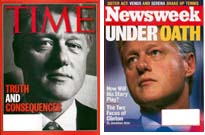
Time, Aug. 31, 1998
(posted Friday, Aug. 21, 1998)
A special issue, published four days early, is a 14 article blitzkrieg of Clinton coverage. The lead story recounts the tense White House countdown to testimony, speculates on how Hillary felt during the ordeal (betrayed, then stalwart), and dissects the legal equivocations in The Speech. Time's exclusive: While Clinton's testimony "generally matched" Lewinsky's, he flatly refused to answer explicit questions about sex before the grand jury and "did not acknowledge engaging in [oral sex] with Lewinsky." ... Another story says that turning over the infamous blue dress to Kenneth Starr was never part of Monica's immunity package. By design, Monica's lawyers never had the dress tested to determine its "smoking gun" potential. After Monica got immunity, her team tossed the dress to Starr as a freebie anyway. ... Another article says that scandal-weary Americans will seek a "straight-shooting" president in 2000. But is Al Gore the one for the job? Can he weather the Clinton scandal? He's jammed between a rock (disloyalty) and a hard place (loyalty). And don't forget all his dubious fund-raising phone calls--they may still lead to an independent counsel investigation.

New York Times Magazine, Aug. 23, 1998
(posted Thursday, Aug. 20, 1998)
The cover piece profiles J. Craig Venter, a hotshot multimillionaire biologist who hopes to map the entire human genome before the U.S. government does. Completing this "Holy Grail" of genetics could hasten cures for cancer, hepatitis, and even HIV-related diseases. Venter claims he can map the genome faster and more cheaply than the feds, but critics worry that he could raise the cost of medical research by patenting DNA sequences that would otherwise be in the public domain. ... An article marvels at the army of screenwriters required for every Hollywood film: Armageddon, for example, employed eight different screenwriters. Each auxiliary writer is a specialist: One adds humor, another adds plot structure, a third adds dialogue that will appeal to women or minorities. The voice of the original writers goes missing in action. ... A short article/diagram says tobacco is not all bad. New tobacco-based medicines, which rely on splicing human genes into tobacco plants, are on the way. Bad news for cigarette fiends: The medicines--which include antibiotics, blood substitutes, and cancer drugs--will be extracted from the plant, not smoked.

Time and Newsweek, Aug. 24
(posted Tuesday, Aug. 18, 1998)
Similar issues from top to bottom, starting with large cover packages on President Clinton's testimony. Newsweek touts its poll, which confirms the conventional wisdom that Clinton should admit, apologize, and move on. Newsweek's literary metaphor: the prez as Dr. Jekyll and Mr. Hyde, ricocheting between "solid and squalid, supersmart and superdumb." Time's cover piece recaps the Clinton-Starr dogfight and opines that "the damage has been done" to the presidency and to the country. A sidebar derides the "it wasn't sex" semantic escape Clinton is reportedly considering. (The newsweeklies' bad luck: Clinton's Monday testimony means the mags will be outdated by the time they hit newsstands.)
In the Africa bombings manhunt, both magazines zero in on Osama Bin Laden, the technosavvy, multimillionaire Saudi exile living in Afghanistan. They think it's unlikely the United States can capture him, and even if we do, it's not clear that he can be prosecuted. (Here is Time's version.) A tough-talk piece by Madeleine Albright in Newsweek makes the case for expanding the budget for international affairs.
Both magazines cover the Glamour-Cosmopolitan shake-up: 70-year-old Glamour Editor Ruth Whitney was axed last week in favor of 41-year-old Cosmo Editor Bonnie Fuller. Newsweek's longer piece likens this to swapping Katharine Hepburn for Madonna: Whitney was revered for her practicality, whereas Fuller exudes buzz. (Here is Time's shorter version.)

The New Yorker, Aug. 24 and 31
(posted Tuesday, Aug. 18, 1998)
A double issue on "Private Lives": Much dirty laundry is aired. A piece on Saul Bellow says his novel Herzog was inspired by his wife's affair with his best friend. ... The youngest daughter of famed aviators Charles and Anne chronicles her life as another Lindbergh baby. The kidnapping and murder of her older brother was rarely discussed, but "pretenders" claiming to be the missing baby frequently showed up at the family's doorstep. ... A writer describes his six absurd years in psychoanalysis. His 80-year-old analyst rarely bothered to listen to his patient's problems. Instead, he liked to discuss "Hannah Arendt's sex life" and other literary gossip. When he wasn't gossiping, the analyst tended to fall asleep.

Weekly Standard, Aug. 24
(posted Tuesday, Aug. 18, 1998)
The cover editorial urges Congress and Ken Starr not to ignore Clinton's other crimes if he confesses to an affair with Monica Lewinsky. He still perjured himself in the Paula Jones deposition and may well have obstructed justice. A related piece says the scandal has paralyzed daily life in the administration: Nothing gets done in the "Potemkin White House." The administration's recent daily initiatives are merely cosmetic. Staffers, meanwhile, are trying to pretend Flytrap does not exist.

Economist, Aug. 15
(posted Saturday, Aug. 15, 1998)
The cover editorial on terrorism says Middle East radicals hate the United States because of America's peacekeeping efforts in the region. Compared to other Western nations, the United States is extremely hard on Iran and Iraq, which draws the ire of terrorists. A related piece forecasts scary "new terrorism," including biological or poison gas attacks within the United States and "cyber-attacks" that could crash the world's financial and communications systems ... A piece laments the "woes" of Madeleine Albright, whose opinions on Iraq, Israel, and even her pet eastern Europe are ignored by Congress, the White House, and other policymakers. She seems to have "less leverage at the White House than Israel's lobbyists."
--Kate Galbraith